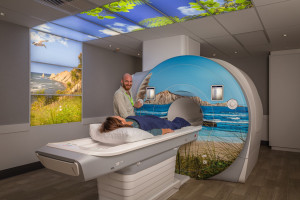What is an MRI?
MRI combines the use of a very strong magnet, radio waves and a computer system to provide detailed images of internal structures and soft tissue structures of the breast. The level of detail seen with an MRI is extraordinary compared with any other imaging modality.
Please note your MRI will be performed at Canopy Imaging.


What is MRI used for?
MRI is an imaging option for examining the breast. It is the most sensitive for the detection of breast cancer. It is used in breast disease to determine the size and number of breast lesions, and to examine the other breast.
It is primarily used as a supplemental tool to breast screening with mammography and ultrasound. It does not use ionising radiation and is the best method for determining if silicone breast implants are intact.
Pre Examination
Please phone us for an appointment. The receptionist will give you:
- Instructions on where to go for your MRI scan
- A list of safety questions
- Information about the preparation needed before your scan - this may include a period without food, and / or the need for an injection of contrast medium
- Information about how to arrange "prior approval" from your medical insurance company for your MRI - this means you can send them the invoice for payment, rather than pay first and then claim.
- Discuss the requirements if ACC funding this examination.
Some MRI scans require an injection of contrast medium. This shows up on the MRI images, and enables the radiologist to identify some organs or internal structures more clearly. It causes no complication in the vast majority of people who have it.
Because the strong magnetic field will affect any metallic object implanted in the body, MRI staff will ask whether you have a artificial joint (eg, hip replacement), heart pacemaker (or artificial heart valve), implanted device (eg, intrauterine device, IUD) or any metal plates, pins, screws or surgical staples in your body. In most cases, surgical staples, plates, pins and screws pose no risk during MRI if they have been in place for more than four to six weeks.
You will be asked if you have ever had a bullet or shrapnel in your body, or ever worked with metal. If there is any question that you may have a metal fragment embedded in your soft tissue, you may be asked to have an x-ray to detect if this is the case. Tooth fillings and dental braces are usually not affected by the magnetic field, but discuss the braces with the radiologist.
As MRI may result in local heating of the skin around tattoos and permanent eyeliner please discuss these with the MRI Radiographer.
If you are particularly anxious about having an MRI, a friend or relative is welcome to come with you to the MRI scanning room. It is safe for them to be in there as there are no x-rays used. This person will also need to complete the questionaire about metallic implants etc.
You will be asked to remove hair clips, jewellery, glasses, hearing aids, and any removable dental plates. If there is a chance you could be pregnant, please let the staff know.
The Examination
The MRI machine is basically a large cylinder-shaped magnet. A specially trained MRI radiographer will position you on a couch that will then move into the donut-shaped cylinder for image capture. You will have to remain very still during the scanning process. If you have difficulty lying flat, or suffer from claustrophobia, please inform the radiologist prior to the examination.
The radiographer will go behind a partition to operate the scanner. He or she is able to talk to you via a two-way intercom during the scan and will let you know what is happening. If you have any questions, please don't hesitate to ask at any time, even during the MRI scan.
The MRI machine makes a loud banging noise (from the coil movement) while scanning. You will be provided with earplugs or headphones to reduce any discomfort from the noise. Please bring along a favourite CD if you’d like us to play this during the scan.
An MRI procedure takes between 30 and 60 minutes.
Post Examination
Once the images of the breast are recorded, the images and report will be sent to your referring doctor.
You may eat and drink normally. There are no after effects from this MRI.

